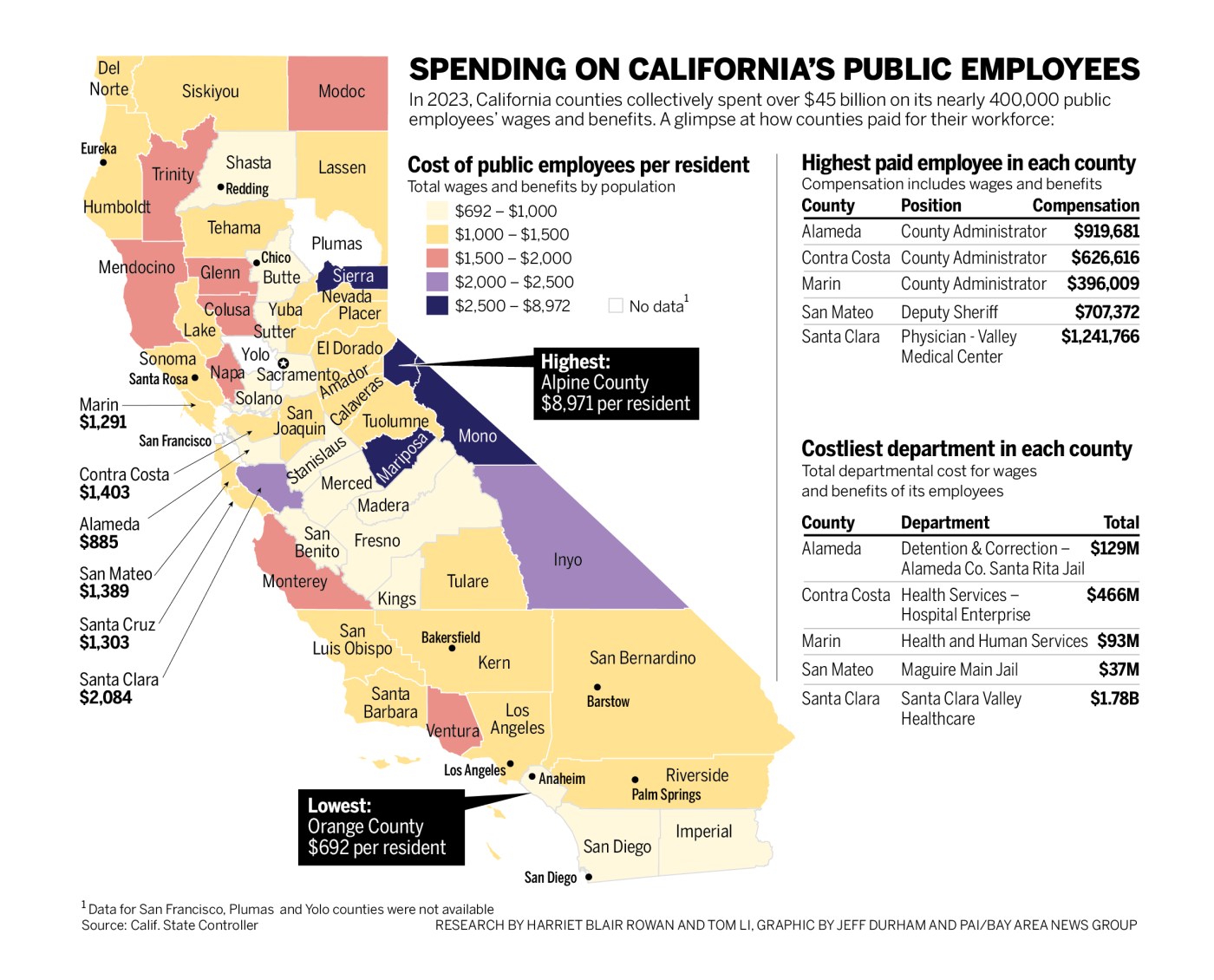Santa Clara County’s recent expansion of its public hospital system has averted closures that threatened to curtail emergency care access but also boosted its staffing of highly paid doctors and health care workers and vaulted its payroll costs to among the highest in California.
That was among the highlights of a Bay Area News Group analysis of employee compensation data that counties report each year to California’s State Controller.
While Los Angeles County had the most employees and the highest total cost for their pay and benefits, as you might expect from California’s most populous county, Santa Clara County came in second, ahead of four other counties with larger populations: Riverside, San Diego, San Bernardino and Orange. They each have more than 2 million residents; Santa Clara has 1.9 million.
Nearly half of Santa Clara County’s employees last year worked in the county’s expansive and growing health care system of hospitals and clinics, which County Executive James Williams said accounts for his county’s hefty payroll. That commitment to growing the county-owned health care system continues as the county plans to add Regional Medical Center to the other three hospitals and 14 clinics the county currently runs.
O’Connor Hospital is one of three hospitals operated by Santa Clara County Health System located in San Jose photographed in 2015. (Patrick Tehan/Bay Area News Group)
“Something big happened in 2019,” Williams said. “We added two hospitals and thousands of employees.”
Mark Hinkle, president of the Silicon Valley Taxpayers Association, is skeptical of the expansion of the county’s public health system, citing the cost to taxpayers and a lack of sufficient competition among health care providers in the region. Hinkle sees the high cost of the county’s employees as inextricably tied to the high cost of living.
“In order to attract doctors, nurses and other health care professionals, we’ve got to jack up their compensation so that they can actually live in the area” Hinkle said. “The cost of housing has a domino effect.”
Statewide, California counties spent a combined $45 billion last year on the nearly 400,000 public employees who work at county agencies around the state. Those county employees include sheriff’s deputies, jail staff, prosecutors, social workers, local elected officials, and nurses and doctors in public health systems, and among many others.
The cost of all those employees has grown by 80% since 2010 when county governments reported about 375,000 employees, whose pay and benefits then cost $25 billion. The state’s cost per employee has grown 71%, from about $67,000 to $114,000 average costs per employee in that time, far outpacing inflation in California, which has grown by 46% in those 13 years.
While not the only county in the state that owns and runs hospitals, Santa Clara County has the second-largest public health system after Los Angeles County, which has 5 hospitals in its system and five times as many residents. While its hospitals serve as safety-net facilities for people without insurance, typical for county hospitals, they also regularly treat those with coverage.
Alameda, Contra Costa and San Mateo counties are also among the 14 counties in the state that own and operate at least one hospital — although on a much smaller scale than Santa Clara.
Santa Clara County spent about $2,084 per resident in 2023 for the county’s 26,800 employees, for a total of nearly $4 billion. That’s the highest amount per resident of any of the state’s large counties and higher than other Bay Area counties. Cost per resident is higher in less populous counties such as Alpine ($8,972).
“You really can’t do an apples-to-apples comparison with other counties because we have such a robust direct health care delivery system,” Williams said. “That is actually rare now. … very few counties still operate hospitals.”
While the costs in Santa Clara County are significant, the large health system also brings in significant revenue that offsets those costs, totaling about $3 billion annually.
“The system doesn’t make a profit — it’s not supposed to,” Williams said. But Santa Clara Valley Healthcare draws billions in federal and other resources, he added. “It’s an asset for all of Northern California.”
Alameda County, with 1.6 million residents, has less than half the number of county employees, and the total compensation for those employees works out to about $885 per resident last year. Contra Costa’s costs were about $1,402 per resident, and in San Mateo it was $1,389.
San Francisco, a city and a county, reports all workers as city employees, so it is not included in the county data.
In 2023, 99 of the top 100 highest-paid Santa Clara County employees were physicians, compensated up to $1.24 million last year in wages and benefits. Roughly 400 of the top 500 costliest employees worked at Santa Clara Valley Healthcare.
The Santa Clara health care system employed over 12,000 people, by far the county department with the largest workforce. Contra Costa’s health system, which has one hospital, is the second-largest with 3,000 employees.
Nearly half, 45%, of Santa Clara’s costs for employees are going to those working in the county health system.
Even outside of Santa Clara County and its huge county health care system, many of the most well-paid Bay Area county employees work in health care or emergency services such as fire safety or law enforcement.
Employees in emergency services departments, like firefighters, often work overtime hours, resulting in higher total compensation numbers, Josh Swedberg, Marin County’s budget director, explained.
But on top of the growing costs of wages, the cost of benefits for county employees has grown dramatically since 2010, far outpacing the growth in the cost of wages. Since 2020, there has been some easing of those costs in Alameda and San Mateo counties, where the total cost of benefits dropped slightly between 2020 and 2023.
Santa Clara is the only county with more public employees in 2023 than in 2010, with 31% more employees in 2023 than in 2010. This is largely because of the expansion of the health care system, which also caused the county to have the biggest increase in the cost of wages.
San Mateo county has 25% fewer employees in 2023 than 2010, the largest drop in the number of county employees of any Bay Area county, and the lowest increase in the cost of wages, just 60% higher than in 2010.












